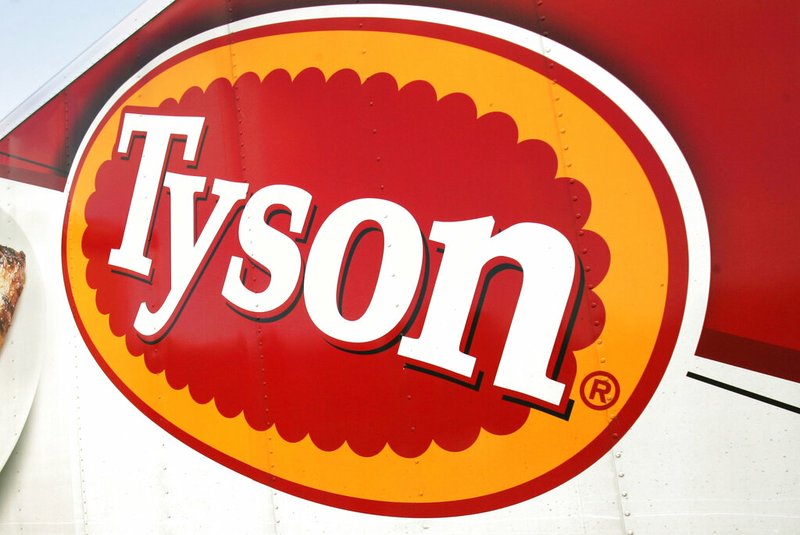Tyson Foods is petitioning to reduce the number of federal meat inspectors at a Kansas beef plant, a request that has consumer advocates concerned for the public's health.
The U.S. Department of Agriculture has been working for years to transfer some meat inspection jobs from public to private oversight. Agency programs already allow for fewer federal inspectors at chicken plants, and similar programs will soon be used for pork and egg processing. Similar programs are being discussed for beef, according to officials familiar with the negotiations.
In March, Tyson Fresh Meats submitted a proposal to use its employees for certain meat inspection duties at a large factory in Holcomb, Kan. Tyson's employees would identify problems with beef carcasses and trim away the defects before Agriculture Department workers would inspect each carcass for further processing, the company said in a waiver proposal earlier this year. It would also allow for faster production line speeds with fewer federal meat inspectors on-site.
The advocacy group Food & Water Watch provided the Arkansas Democrat-Gazette with a copy of the proposal. The group obtained the document through a Freedom of Information Act request. NBC News first reported on it.
According to Tyson, the purpose of the beef plant waiver request is to explore other meat inspection methods that are similar to the current standard without sacrificing safety and quality control.
"The requested waivers will not adversely affect product safety, jeopardize the safety of the inspection or company personnel," Tyson said in the proposal, dated March 11. What it would do is offset the workload of USDA inspectors to Tyson employees and allow line speeds to be unchanged with fewer federal inspectors.
"From a food safety standpoint, that is a disaster waiting to happen," said Tony Corbo, senior lobbyist at Food & Water Watch. He says Tyson's move to privatize inspection duties is a way to work around line speed caps and "reduce the number of inspectors on the slaughterlines, if not all of them."
Since the 1990s, the USDA has been testing inspection changes through pilot programs based on extensive public input. But President Donald Trump's administration isn't planning to create a formal pilot program to overhaul beef inspections, instead, NBC News reported they would rely on company requests like Tyson's to inform the agency's next steps.
"Contrary to the impression left by some news media," Tyson's request to "modernize food safety inspection at one of its best beef plants is consistent with a long-standing, science-based government program," Tyson spokesman Worth Sparkman said in an email Wednesday.
Under Tyson's proposal, USDA inspectors would continue to conduct "100% of the inspections of the animals both before and after harvest," Sparkman said. Regardless of the final decision, Tyson remains committed to its food safety, animal welfare and worker safety programs, he said.
In 2015, the USDA made final a poultry slaughter rule which allowed companies to take ownership of certain chicken inspection duties once handled by federal workers. Last year, the Trump administration proposed similar rules for egg and pork processing plants, and is working to make those proposals final. A spokesman with the USDA said talks on the beef side have been taking place the past year.
Thomas Gremillion, director of food policy at Consumer Federation of America, took issue with how the proposed changes for meat inspections guarantee a similar level of food safety and quality, instead of trying to improve the current system. Citing recent research and data, he said the chicken plants operating under with fewer federal inspectors actually were "a little bit dirtier and had more traces of salmonella."
In the proposal, Tyson requested a waiver for certain staffing standards based on the number of carcasses inspected per hour. As a result, the company can have fewer USDA inspectors on site without slowing down production or line speeds.
The actual line speed numbers were redacted in Tyson's proposal, but Corbo estimated U.S. beef plants operate about 390 cattle head per hour.
In the beef proposal, Tyson said that it does plan to maintain current daily harvest levels, but will routinely "assess and adjust our line speed to operate a process in-control regarding food safety and animal welfare systems."
Tyson's waiver proposal is currently under review and has not been approved by the USDA. In an emailed statement, a spokesman with the agency said Tyson's beef plant in Holcomb, Kan. is the only beef facility requesting a waiver.
The processing plant is indefinitely closed because of damage caused by a recent fire. Tyson has said it plans to rebuild the facility as quickly as possible and is paying full-time workers while the plant is idle.
Tyson Foods shares fell $2.06, or more than 2%, to close Wednesday at $85.76 on the New York Stock Exchange.
Business on 08/15/2019
